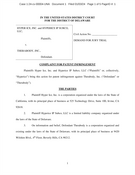-
Uniloc 2017 LLC v. Brightcove Inc. et al DC
- 1:19-cv-00180
- D. Del.
- Judge: Colm F. Connolly
+1
- Filed: 01/30/2019
- Closed: 04/28/2020
- Latest Docket Entry: 04/28/2020
- PACER
- Docket updated daily
1
Plaintiff
2
Defendants
4
Accused
Products
4
Patents-in-Suit
455
Days in
Litigation
-
Uniloc 2017 LLC v. Brightcove Inc. et al DC
- 1:19-cv-00180
- D. Del.
- Judge: Colm F. Connolly
+1
- Filed: 01/30/2019
- Closed: 04/28/2020
- Latest Docket Entry: 04/28/2020
- PACER
- Docket updated daily
Cause of Action
Infringement
Market Sector
Media Content and Distribution
Court
Referred Judge
Assigned Judge
- Patent Information
